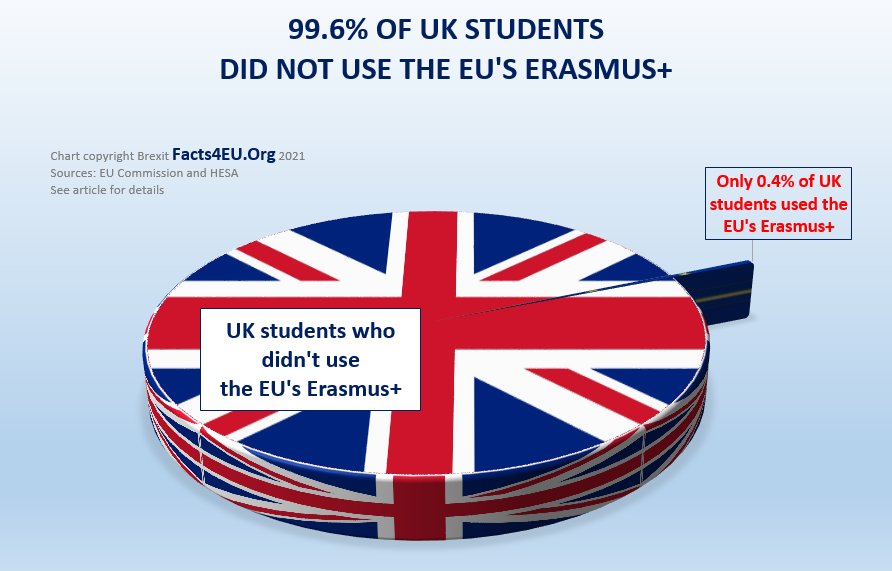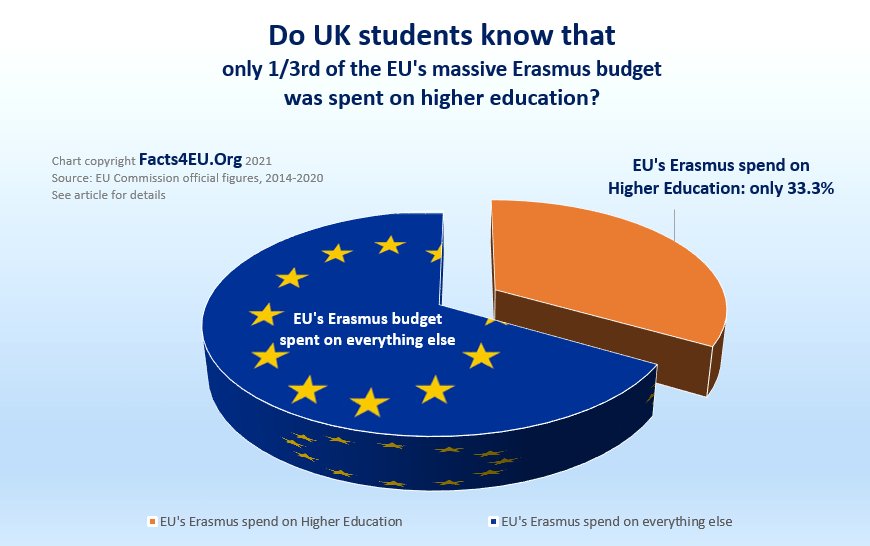How UK’s Turing trumps EU’s Erasmus for young British people
British students become the winners thanks to Brexit

Montage © Facts4EU.Org 2022
More students, more countries accessed, more support for the disadvantaged – a formula for success worthy of Alan Turing’s name
Being briefed on a diet of Rejoiner propaganda, most students, parents and academics will probably be shocked to learn just how good the Turing Scheme is compared to what was provided in the past.
The Turing Scheme – the UK government’s replacement for Britain’s involvement in the EU’s Erasmus+ education support – is an undoubted winner for students. And yet many who should know better, or have simply failed to look up the facts, moan as if a great crime has been committed against Britain’s youth by leaving Erasmus+.
How does the Turing Scheme compare with the EU's Erasmus+?
Following-up on yesterday's exclusive Facts4EU.Org survey of how British universities fared in the four World internationally recognised rankings – showing they were second only to the top US universities and had a positive ratio of 16 to 1 against the EU rankings – we move on to look at how the new Turing Scheme compares with Erasmus+.
Brexit has allowed the UK not just to redirect funds previously committed to Erasmus+ but actually to increase funding by developing a tailor-made scheme that is bigger, offers more opportunities, and is truly global – not limited to the EU’s narrower confines.
Below we show how the two schemes compare.
1. UK’s Turing Scheme
The Turing scheme applies to UK organisations from higher and further education, vocational training, and schools sectors which can offer their students and pupils life-changing experiences to study or work abroad.
Initially launched for one year with a £96m budget so there was a replacement for Erasmus+ in place, 363 institutions were approved to deliver placements for more than 40,000 British students across 159 destination countries – including Canada, Japan, Australia and the United States – wider than those of the Erasmus+ programme.
Now the Turing Scheme has been extended by the UK Government for a further three years with an increased budget of £110m for 2022/23.
The Turing Scheme goes further than giving a relatively small number of participants the opportunity to benefit from working and studying abroad. Instead it goes on to double the number of students and has provided around 48% of its placements to young people from disadvantaged backgrounds.
Some 13.5% of all Turing Scheme higher education projects are planned for the United States (more than double the next popular country, China), with Canada and Australia also in the top five most popular destinations, along with France. For schools, France (22.78%) and Spain (17.49%) are the most popular destinations.
Brexit Facts4EU.Org Summary
For international students, Brexit Britain is still the place to come
Last year in a written statement to Parliament in response to a Labour MP’s question, the Minister of State for Higher and Further Education, Michelle Donelan, stated:
“The Turing Scheme is the UK’s global programme to study and work abroad. We are funding UK-based providers so that their students, learners and pupils can go on mobilities abroad and we expect overseas partners to do the same in return thereby facilitating international exchanges. The UK is a very attractive destination for international students, the most attractive in the world after the USA. It is clear that we have considerable appeal as a destination and partner in international mobilities and exchanges, not just within the EU, but across the world.”
The Rt Hon Michelle Donelan MP
Ms Donelan was replying to a question from Labour MP Taiwo Owatemi. Ms Donelan also commented on tuition fees, saying:
“For all students participating in the Turing Scheme, we expect tuition fees to be waived by host institutions, as is typical under Erasmus+ and other exchange programmes. This is a matter for individual institutions to agree, and something that universities do as a matter of course when they form exchange partnerships with international providers.”

The Rt Hon Michelle Donelan MP

Taiwo Owatemi MP
2. EU’s Erasmus+ Programme
Erasmus+ was not the student exchange programme its supporters branded it but a far wider programme, involving sport, youth and adult work, and other activities, and it was vastly expensive, costing billions.
In a previous study Facts4EU ascertained that only 0.4% of UK higher education students used Erasmus – leaving the other 99.6% outside of the programme.
In total only 200,000 British students had benefited from Erasmus since 1987 – an average of fewer than 7,000 students a year, compared to the 35,000 planned in the first year of the Turing Scheme and over 40,000 in its second year.
In 2018 18,305 young people departed from the UK for study through Erasmus+ placements while 30,501 Erasmus-supported students came to the UK – the regular pattern of past years. It was this imbalance that especially made Erasmus unattractive to the UK as the student tuition fees in Britain were covered by the UK government.
Whilst Erasmus+ has 'partners' globally, British student placements were not world-wide but went mainly to the institutions of the 34 participant countries in Europe.
Only 1/3rd of the Erasmus+ budget was for student exchanges
A full two-thirds of the Erasmus+ budget was not for any form of student exchanges for young people – but for “partnerships and reforms of the education and youth sectors.”
Only one-third of the budget was for “learning opportunities abroad for young people”. In other words it was institutionally-focussed, not a student-focussed scheme – hence why its adherents were in the main administrators and academics.
The UK taxpayers and students received little return from Erasmus+
In 2019 the UK received only £79 million (€87m Euros) in grants for higher education students out of an average Erasmus+ budget of €2.34bn euros. In sterling terms the entire EU budget equated to c.£2bn per year.
The latest variation of the Erasmus+ programme applied to EU member states and to Iceland, Liechtenstein, Northern Macedonia, Norway and Turkey. The post-Brexit UK was invited to join for the next seven-year programme but at an indeterminate cost calculated on the basis of UK GDP plus an annual fee - the amount was open-ended. Attempts to estimate the cost priced Erasmus+ at £2bn over the seven-year programme.
Rather than being a student educational exchange programme, Erasmus+ also covered staff. It was their uptake that was significantly high and unsurprisingly won many disciples to continued UK participation.
A British student studying Japanese at a UK university requiring a year studying in Japan would not be eligible for any financial support under Erasmus+. Under the Turing Scheme, however, such a student can apply for living costs support.
According to the Department for Education approximately 560,000 international students come to the United Kingdom each year.
Observations
Another Brexit success story
Whichever way you look at it, because the Turing Scheme is designed in Britain for our own students and institutions – and with targeted funding - it brings more benefits to more people across a wider demographic and especially the disadvantaged – as well as supporting our education sector.
The Erasmus Programme that evolved from 1987 became a bureaucratic propaganda exercise that led to it being unaffordable and unfit for purpose. It did not seek to help the most disadvantaged or expand educational opportunities world-wide but was part of an exercise to build a European demos at taxpayers’ expense and without their consent.
Now the British Turing Scheme is reaching out where other programmes could not – including more pupils and students, including more countries and more ages, while helping disadvantaged groups. By not funding other countries’ students and focussing on student placements and not institutional programmes or partnerships, better value for money is obtained and more young people are helped.
The Turing Scheme adds up to another Brexit success story.
Facts4EU.Org needs you today
We are a 'not for profit' team (we make a loss) and any donation goes towards the actual work, not plush London offices, lunch or taxi expenses, or other luxuries of some organisations.
We badly need more of our thousands of readers to donate. Could this be you, today? Maybe you've been thinking about it, but just haven't got around to doing it? If so, let us reassure you. It's quick and easy and we use two highly secure payment providers. And we do NOT ask you for further donations if you donate once - we just hope that you keep supporting us. Your donation stays anonymous unless you tell us otherwise.
Please don't assume that other people will keep us going - we don't receive enough to survive and we need your help today. Could you help us?
Most of our readers are well-informed and appreciate our fact-based articles, presented in a way you won't see anywhere else. If you value reports like the one above, please help our work with a donation. We have far more to do in researching, publishing, campaigning and lobbying Parliament than we have in terms of the financial resources to fulfil these tasks. We badly need funding to continue - we rely 100% on public donations from readers like you.
If you believe in a fully-free, independent, and sovereign United Kingdom, please make a donation now. It’s quick, secure, and confidential, and you can use one of the links below or you can use our Donations page here. You will receive a personal, friendly ‘thank you’ from a member of our team within 24 hours. Thank you for reading this.
[ Sources: House of Commons Library | Dept for Education | EU Commission ] Politicians and journalists can contact us for details, as ever.
Brexit Facts4EU.Org, Wed 05 Jan 2022
Click here to go to our news headlines
Please scroll down to COMMENT on the above article.
And don't forget to actually post your message after you have previewed it!
Since before the EU Referendum, Brexit Facts4EU.Org
has been the most prolific researcher and publisher of Brexit facts in the world.
Supported by MPs, MEPs, & other groups, our work has impact.
We think facts matter. Please donate today, so that we can continue to ensure a clean Brexit is finally delivered.
Paypal Users Only - Choose amount first
Quick One-off
Monthly




Something to say about this? Scroll down for reader comments